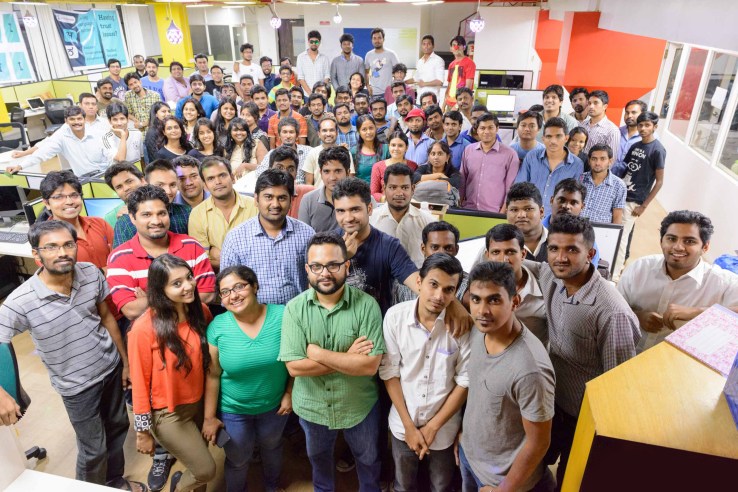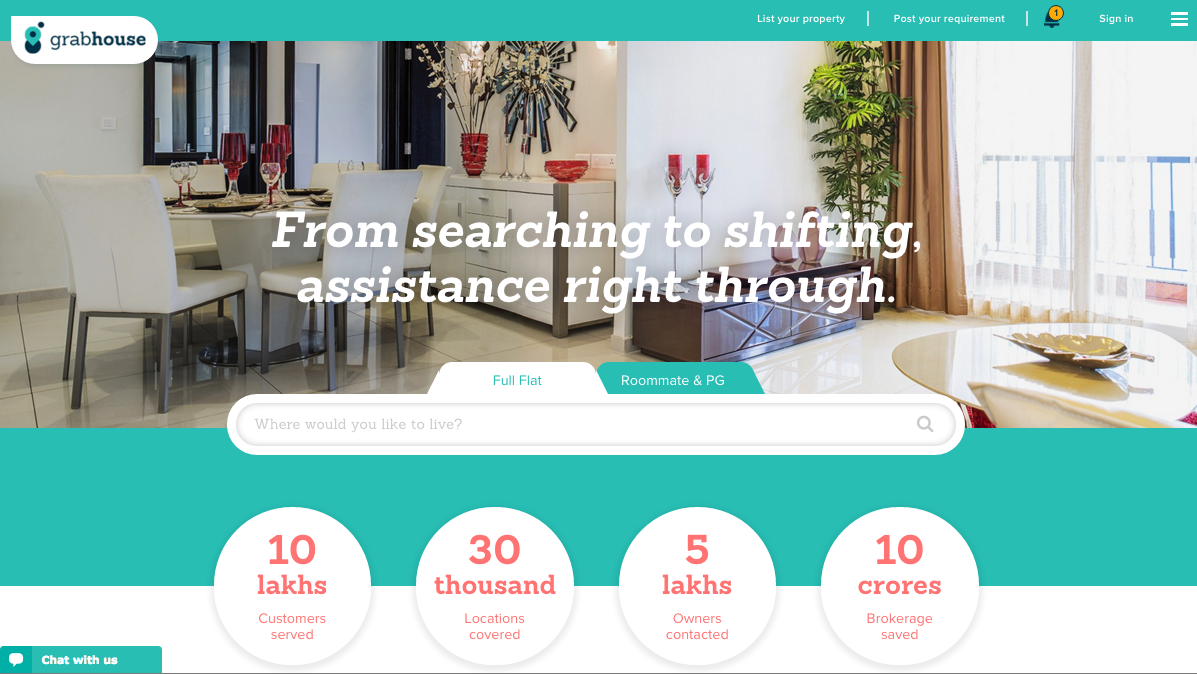
Real-estate startup Grabhouse’s team
While participating in non-profit Teach For India, Pankhuri Shrivastava and Prateek Shukla got a firsthand look at how chaotic the country’s rental market is, especially for people on a tight budget. Despite the real estate market’ s rapid growth, brokers don’t need licenses or other professional qualifications and many charge excessive fees for basic services. Even searching online classifieds was difficult because most were listed by agents.
“The experience was very bad and they were not able to help me find what I was looking for. I realized I had absolutely no information about a city or where I was going to stay and that agents were not going to help me out because all they want is a commission,” Shrivastava says.
Motivated by their experiences, Shrivastava and Shukla founded Grabhouse in 2013. The site only accepts listings directly from property owners, who aren’t charged unless they close a rental through Grabhouse. It is now available in eleven cities and recently closed a $10 million Series B from returning investors Sequoia Capital and Kalaari Capital. Along with a $2.5 million Series A it raised from the same firms just eight months ago and earlier angel funding, the brings Grabhouse’s total venture capital so far to about $13 million.
The Series B will be used go to build a “virtual neighborhood specialist,” or online platform that will help Grabhouse scale up by giving users more tools, including property and neighborhood tours. It also plans to launch two new products geared to people looking for shared accommodation.
Grabhouse claims that 2,000 listings go live on its site every day and that it has already closed 50,000 properties. The startup competes with multitude of other sites, like Housing, PropTiger, Commonfloor (all of which have received significant venture backing), but Shrivastava says Grabhouse differentiates by not only focusing on finding properties, but also providing followup services to make it easier to move in, like cleaning, painting, and utilities setup.
“We want something that is focused on fulfillment, not just discovery and that goes beyond classifieds, so that people go beyond information sharing,” says Shrivastava.
Taking brokers out of the equation
She adds that the listings on many other real estate sites are provided by brokers. Grabhouse, on the other hand, takes a zero-tolerance approach to real estate agents, which the company claims protects owners and prospective tenants and saves them money. Since there aren’t formal oversights for brokers in India, they vary widely in helpfulness. Shrivastava says brokers often act as “gatekeepers” to property information, charging large fees—about 8.3% of annual rent in some cases—solely for access to landlord contact information.

Before launching, Grabhouse collected public contact information for more than 80,000 real estate brokers and blocked their emails and phone numbers (which are required to create listings) from the site. If agents manage to post listings, users are encouraged to report them.
Grabhouse already operates in eleven of India’s busiest real estate markets, including Bengaluru, Mumbai, and Delhi. Instead of launching in more places, Shrivastava says it plans to go deeper into each of its current markets.
All listings, which are checked by Grabhouse before going live, need to include basic data like rent, the property’s condition, commuting options, and a neighborhood profile. Owners also have to say if the location is suitable for single women or families. Shrivastava adds that buildings often refuse to rent to single men, but don’t disclose that information upfront, so Grabhouse requires it in every listing.
The startup currently monetizes with two models. Its basic option charges a small fee, or 49 rupees (about 75 cents), for a property owner’s contact information. The second costs 999 rupees (about $15) and gets users the assistance of Grabhouse employees called “neighborhood specialists” to help them find listings and arrange move-in services. Shrivastava says Grabhouse rarely hires former real estate agents and instead looks for people who worked in financial services, like credit cards or insurance. Unlike brokers, neighborhood specialists get incentives based on customer satisfaction instead of a percentage of annual rent.
The neighborhood specialist program performed so well that Grabhouse decided to launch its virtual version. In addition to online tours, the platform will have a calendar so apartment hunters can coordinate in-person tours and other services. The feature is expected to launch in about four to six months. Shrivastava claims this will reduce the number of hours people spend visiting properties.
“The most exciting thing is working on our virtual neighborhood specialist,” she says. “It will be groundbreaking for real estate in India and extremely different from anything else out there.”